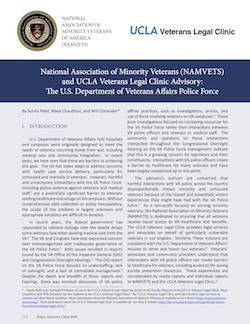Veterans Legal Clinic Issues Advisory on VA Policing

UCLA School of Law’s Veterans Legal Clinic has teamed with the National Association of Minority Veterans of America to publish an advisory that outlines police practices and policies on Veterans Administration campuses that create barriers to providing necessary care for veterans.
The advisory, “The U.S. Department of Veterans Affairs Police Force,” aims to compel Congress and the VA to investigate excessive police force, biased policing, surveillance tactics and other problematic practices involving people of color or homeless, mentally ill or otherwise vulnerable veterans who turn to the VA for help. The advisory emphasizes that the COVID-19 pandemic exacerbates concerns for veterans’ health and safety and adds urgency to an already troubling situation.
UCLA Law Professor Sunita Patel, along with students Maya Chaudhuri ’21 and Will Ostrander ’20, worked with NAMVETS of America to draft the report. Patel is the faculty director of the Veterans Legal Clinic, which opened in 2017 on the West Los Angeles VA campus. Since then, UCLA Law students have provided direct representation and advice to more than 500 veterans seeking assistance with VA benefits and other civil legal services.
“The VA police operate outside of public view,” Patel says. “VA police are less transparent and accountable to the public or communities they serve than other law enforcement agencies, even as they deal with an extremely vulnerable population.”
Founded in 1969, NAMVETS of America has chapters across the country and is committed to improving the lives of people who previously served in the U.S. armed forces. “Across the country, we hear from black and other minority veterans who have had negative encounters with VA police,” says Horace Walker Jr., director of NAMVETS of America’s national veterans claims center. “VA grounds should be safe havens where veterans can get the support they need.”
Through their work with the clinic, Chaudhuri and Ostrander have gained insight into the institutional and societal obstacles facing veterans in need.
“Veterans seeking health care on VA campuses have to interact with VA police, but there is little to no attention to the policing practices,” Chaudhuri says. “It is essential that we reduce barriers to health care, especially during a pandemic, and policing is an unexamined barrier for veterans.”